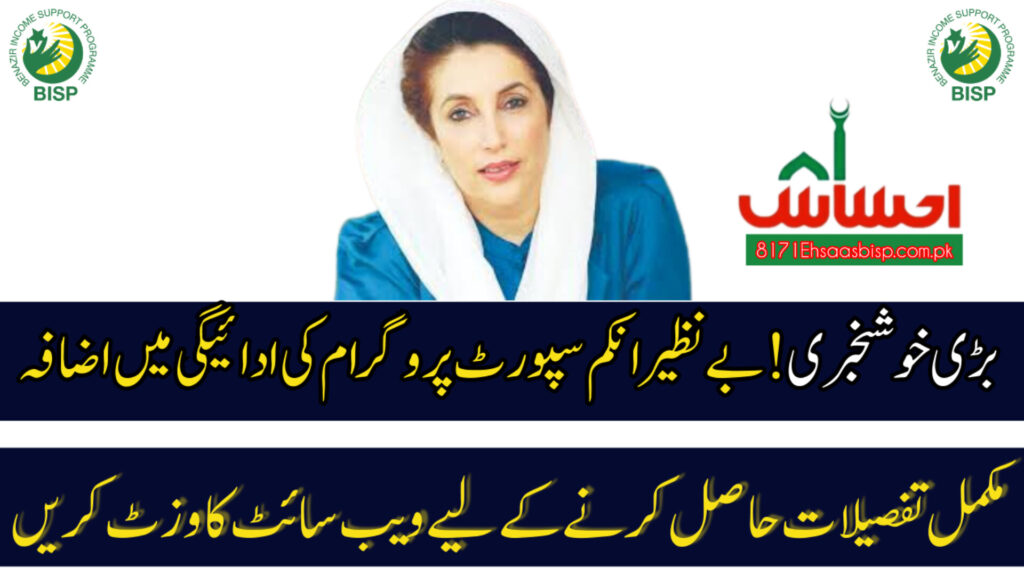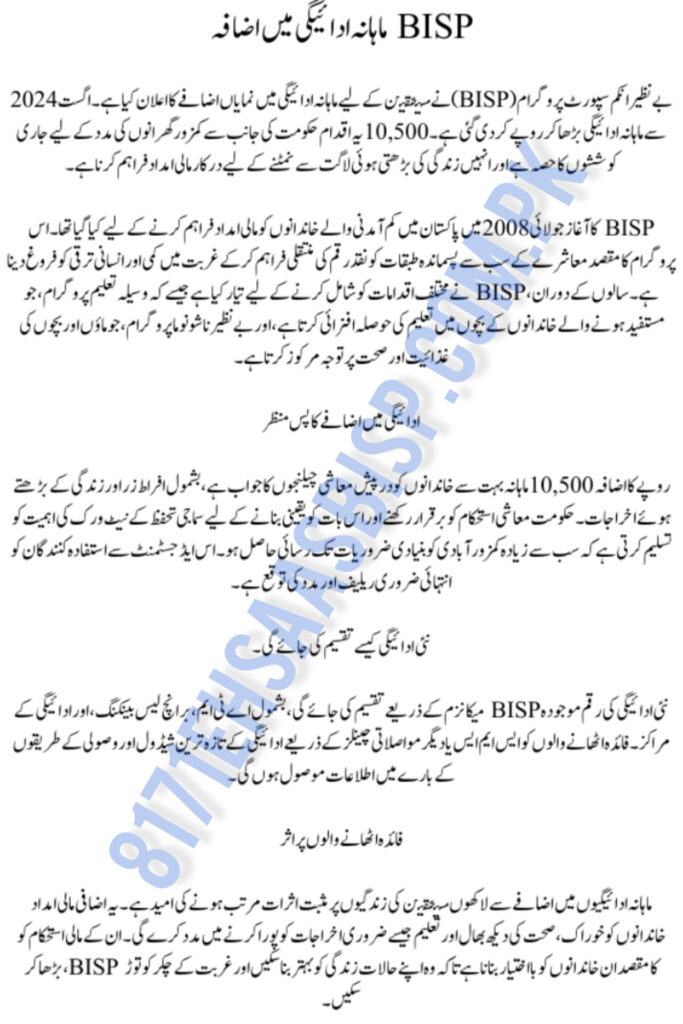
The Benazir Income Support Program (BISP) has introduced a notable increase in its monthly payments, raising the amount to Rs. 10,500 starting from August 2024. This increase comes as a part of the government’s continued commitment to supporting vulnerable households and ensuring they receive the financial assistance necessary to manage the rising cost of living.
Overview of the Benazir Income Support Program (BISP)
Launched in July 2008, BISP is a crucial social safety net aimed at providing financial aid to low-income families across Pakistan. The program’s primary objective is to reduce poverty and enhance human development through cash transfers to the most economically disadvantaged segments of society. Over the years, BISP has expanded to include various initiatives like the Waseela-e-Taleem program, which encourages education among children from beneficiary families, and the Benazir Nashonuma program, which focuses on improving nutrition and health for mothers and children.
Rationale Behind the Payment Increase
The decision to raise the monthly payment to Rs. 10,500 is a direct response to the economic challenges currently faced by numerous families, including inflation and increasing living expenses. The government recognizes the critical role of social safety nets in maintaining economic stability and ensuring that the most vulnerable populations have access to basic necessities. This adjustment in payment is anticipated to provide much-needed relief to beneficiaries, helping them to better manage their daily expenses.
Distribution of the New Payment Amount
The increased payment will be distributed through the existing BISP infrastructure, which includes ATMs, branchless banking systems, and designated payment centers. Beneficiaries will receive notifications about the updated payment schedule and methods of collection via SMS or other communication channels, ensuring that they are well-informed and able to access their funds without any complications.
Expected Impact on Beneficiaries
The increase in monthly payments is projected to have a substantial positive impact on the lives of millions of beneficiaries. This additional financial support will aid families in covering essential costs such as food, healthcare, and education. By providing this enhanced financial stability, BISP aims to empower these families to improve their living conditions and take meaningful steps towards breaking the cycle of poverty.

9See Also:-}
- Breaking News: How to Apply for the Agriculture Internship Program: A Detailed Guide 2024
- Exclusive Updates: Punjab Government Announces Major Recruitment Drive for 30,000 Teachers 2024
- Breaking News: Sindh Textbook Board Launches Ambitious Tablet Distribution Initiative for Students 2024
- ASF Jobs Apply Before August 25, 2024 – Complete Guide
- Exclusive News: Huawei Train the Trainer Program: A Groundbreaking Initiative for Pakistani Students in 2024
Frequently Asked Questions
Q1: What is the Benazir Income Support Program (BISP)?
The Benazir Income Support Program (BISP) is a government initiative established in 2008 to provide financial aid to low-income families in Pakistan. It seeks to alleviate poverty and promote human development through cash transfers and other supportive programs.
Q2: What is the new monthly payment under BISP?
Starting from August 2024, the monthly payment for BISP beneficiaries has been increased to Rs. 10,500.
Q3: Why was the payment amount increased?
The increase was made in response to the escalating cost of living and economic challenges faced by low-income families. The objective is to offer additional financial assistance to help these families meet essential expenses.
Q4: How will beneficiaries receive the new payment amount?
Beneficiaries will receive the new payment through existing BISP distribution mechanisms, including ATMs, branchless banking, and payment centers. They will be notified about the updated payment schedule and collection methods via SMS or other communication channels.
Q5: What impact is the payment increase expected to have?
The payment increase is anticipated to improve the financial stability of beneficiaries, enabling them to cover essential expenses like food, healthcare, and education. This support is designed to enhance their living conditions and help them break the cycle of poverty.
Q6: How does BISP ensure the effective implementation of the new payment structure?
BISP has strengthened its monitoring and evaluation mechanisms to ensure the effective implementation of the new payment structure. Regular audits and beneficiary feedback are employed to assess the program’s impact and identify areas for improvement. The government is also collaborating closely with financial institutions to ensure a smooth and transparent distribution process.
Q7: What are the future prospects for BISP and social protection in Pakistan?
The increase in BISP payments is part of a broader strategy to expand social protection in Pakistan. The government intends to introduce additional measures to support low-income families, including more comprehensive health and education programs, aiming to establish a sustainable and inclusive social protection system.
Q8: Who is eligible for BISP?
Eligibility for BISP is determined based on factors such as household income, family size, and socio-economic status. The program targets the most disadvantaged segments of society, including widows, orphans, and persons with disabilities.
Q9: How can one apply for BISP?
Applications for BISP can be submitted through designated BISP offices or online via the official BISP website. Applicants must provide the necessary documentation to prove their eligibility.
Q10: What other programs are included under BISP?
BISP encompasses various initiatives such as the Waseela-e-Taleem program, which promotes education among children from beneficiary families, and the Benazir Nashonuma program, which focuses on enhancing nutrition and health for mothers and children.
Conclusion
The increase in BISP payments to Rs. 10,500 in August 2024 marks a significant advancement in the government’s efforts to enhance social protection in Pakistan. By offering additional financial assistance to low-income families, the government aims to improve their living conditions and foster economic stability. As the government continues to expand and reinforce social protection programs, BISP is set to play a pivotal role in reducing poverty and promoting human development across the nation.
